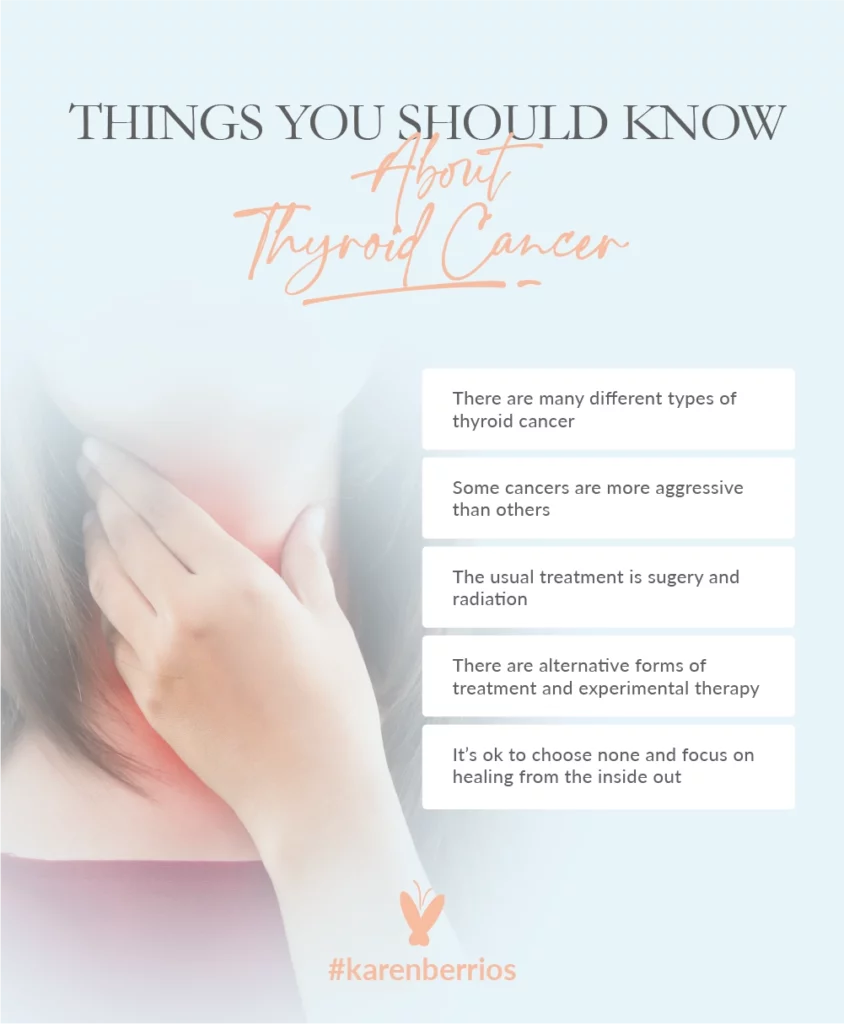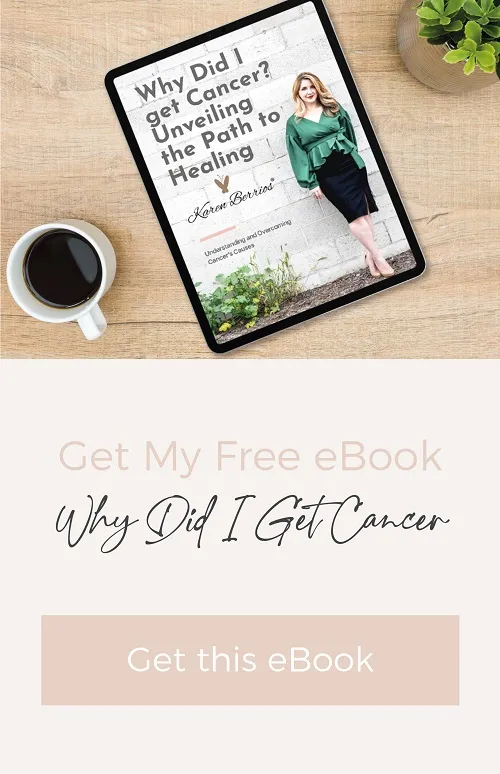

Things you Should Know About Thyroid Cancer
About Thyroid Cancer. Getting a thyroid cancer diagnosis is always hard and it may leave you feeling scared, sad, angry, and completely confused about what to do next. And although many people might be trying to help you by giving you ideas and solutions they think should be the next step, the ultimate decision falls on you, and you have the right to take a breather.
Thyroid cancer, like most other cancers, exists in a variety of different forms, with different symptoms, severity, stages, and treatment options. But, even with all of the medical tools, therapies, and experimental treatments you might have at your disposal, it’s still your right to refuse all of them and find a way to heal through alternative options. It’s your life and no one could ever tell you what to do and how to live it.
This is a type of cancer that grows in your thyroid gland and impairs its function. Your thyroid regulates many different important processes in your body, from metabolism and body temperature to your heart rate and blood pressure. It’s made with two main types of cells, follicular and C cells, which can both begin rapidly growing and dividing, causing cancer.
That being said, there are also plenty of benign tumors that can grow in your thyroid gland and they don’t pose a huge risk to your overall health.
Main Types of Thyroid Cancer
There are three main categories of thyroid cancer which can then diversify into subcategories. Each one attacks different cells, comes with a bit variable symptoms, and shows healing results with different therapies.
Differentiate
The most common type of thyroid cancer belongs under this category and they develop from thyroid follicular cells. There are three main subtypes of differentiated thyroid cancer:
- Papillary thyroid cancer or carcinoma – the most common type of thyroid cancer that grows slowly but can often spread to the lymph nodes in your neck. They are fairly treatable and are rarely fatal. The usual treatment involves surgery and radioiodine therapy.
- Follicular thyroid cancer or carcinoma – usually happens due to iodine deficiency and although it cannot spread to the lymph nodes, it can show up in other areas of your body. It’s a bit harder to treat and has a weaker prognosis than papillary thyroid cancer, but it’s still considered mostly manageable and treatable. A surgical procedure is the usual route of treatment as well as radiation therapy.
- Hürthle (Hurthle) cell thyroid cancer – a very rare form of thyroid cancer that only occurs in about 3% of cases. It’s usually more aggressive than other variants and the most common treatment is surgery.
Medullary Thyroid Cancer
A rarer type of cancer than differentiated thyroid cancers, medullary thyroid cancer develops from C cells instead of follicular and sometimes it can spread to your lymph nodes and other areas of your body. There are two main subtypes of medullary thyroid cancer:
- Sporadic MTC – not hereditary, usually shows up in older adults
- Familial MTC – inherited, usually shows up in childhood and poses a risk for the development of other cancers. Advances in genetic testing have helped identify risk factors and inherited mutations in order to start targeted therapy.
In these types of cancers, surgery remains the first and best treatment option. Still, there are some experimental clinical trials underway with more promising agents and medications.
Anaplastic Thyroid Cancer
Also called undifferentiated thyroid cancer, this very rare form of cancer is aggressive, hard to treat, and easily spreads to lymph nodes and other areas of the body. The overall survival rate is very low, with metastasis occurring already during diagnosis.
Other Types of Thyroid Cancer
There are some other types of thyroid cancer such as thyroid lymphoma and thyroid sarcoma which are rare and often times aggressive, spread to other areas of the body, and are hard to treat.
Diagnosis and Prevention
The most important thing in thyroid cancers as well as any other cancers is early prevention. When caught on time, especially if the cancerous cells haven’t spread to any other area of the body, they are easier to treat, remove, and prevent from wreaking havoc in any body system. Unfortunately, many forms of thyroid cancer do not have notable symptoms so going to the doctor to check it out isn’t your first call.
That being said, whenever you feel any sort of neck nodule or a lump, inexplicable weight gain or weight loss, as well as trouble regulating your body temperature, schedule an appointment with your doctor and let them perform all the necessary tests.
When it comes to prevention, there is plenty you can do by fine-tuning your lifestyle routines and habits and making them healthier:
- Eat a healthy and balanced diet
- Avoid processed foods and excess sugar
- Include more plant-based foods
- Eat superfoods that are rich in cancer-fighting antioxidants and other plant compounds
- Schedule regular exercise
- Improve your sleep quality
- Implement self-care routines and lower your stress levels
- Perform regular self-checks and don’t skip your yearly doctor check-ups

Treatment
From a medical standpoint, every thyroid cancer has its own treatment plan and options, most of which involve surgery, radiation, and other forms of aggressive procedures. And although they often times result in success, they also bring on a plethora of long-term side effects to the table.
In most cases, you’re stuck with a life-long hormone replacement therapy since your thyroid gland is removed, but you might also lose your voice, have damage in your parathyroid glands that are located behind your thyroid gland and help regulate calcium levels, excessive bleeding and a blood clot in your throat, and there’s always a risk of infection.
When there’s radiation involved, you might experience nausea, fatigue, issues with swallowing, dry mouth, coughing, issues with your skin, and low blood count.
There are studies that support alternative treatment options for thyroid cancer and the ones that yield the most success are redifferentiation therapy and molecular target therapy.
If you choose to take the medical route, that’s your choice and no one should judge you for it, but if you choose to take the more unconventional route and refuse surgery and radiation, you should just as much be treated with the same compassion and no-judgment.
If your choice is to listen to your body and trust other forms of treatment, please feel encouraged to do so. There’s no one who knows your body better than you do and sometimes overdiagnosing and going from one doctor to another is just causing more stress and inflammation in the process, potentially harming you in ways you aren’t even aware of.
Final Thoughts
Finding out you have cancer is hard. Figuring out what to do next is even harder, especially if you have people around you who will do everything in their power to help you. It’s ok to take a step back, it’s ok to be scared, and it’s also ok to listen to your gut and follow the treatment plan that you believe in.
There is no right or wrong here.
It’s your journey, your battle, your life.

hey there
I'm Karen!
I have found my cancer journey to be a positive and profound transformational experience. I’m inspired to share my healing journey here, and trust you’ll find hope, encouragement and purpose as you discover the healing power that lies within you.
Join
The Mailing List!
By signing up for my newsletter, you agree with our Privacy Policy and Terms & Conditions.


